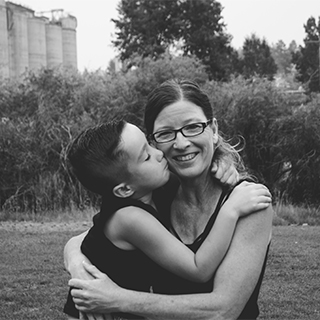Our Perspectives: You Can’t Pour from an Empty Cup

In these times of stay-at-home orders, physical distancing, and remote teaching and learning, we need to nurture ourselves. In this issue of Montana Voices Amplified, members of the Rural Institute Consumer Advisory Council* share the strategies they use to reinvigorate and replenish themselves. Maybe you can use these strategies to “fill your cup” too!
May We Rest in Hope
By Mathalia Stroethoff, with Help from Her Mom, Jan
My name is Mathalia Stroethoff. I am twenty-six years old. I graduated from Big Sky High School in 2013. I enjoyed adult life for seven years when COVID-19 cancelled everything! I stopped going to my three jobs and to my fun activities; my helpers also stopped coming to my house. It was hard. I was confused.
I started spending most of my time with Mom and Dad. My mom helped me with my feelings. First, she helped me feel the disappointment of my schedule falling apart. She helped me with Bible verses: Let [us] sit alone and keep silent, because God has laid it on [us] (Lamentations 3:28).
I have a printed schedule for every day so when COVID cancelled everything, my mom crossed off each activity on my paper. She did not delete it because she wanted me to know that it was okay to be sad when I looked at the big X on my schedule. Keeping it on the schedule also gave me hope that the fun would come back into my life.
After we sit with the hard feelings for a while, my mom always asks me about other things that are happening. Together we look for the good in every hard time: The lines have fallen to me in pleasant places (Psalm 16:6).
For example, after I got home from being cold and had sore feet, I drew a picture. While I was drawing the picture, my mom helped me remember how fun it was to be outside, enjoying the mountains, the grass and the beautiful sky.
During COVID, my mom started Prayer Time on Zoom; she said Zoom and the microphone from MonTECH were unexpected blessings in the middle of chaos. The microphone helped my friends understand my prayers better, and my friends gave me the idea of writing letters to people who were sick or sad. We were blessed to connect with prayer partners on Zoom and we reached out to our friends through the mail: I will bless you . . . and you will be a blessing (Genesis 12:2).
My mom would say that dealing with hard times is like a circle, not a straight line, and that it is okay to go forward as well as backwards. It’s a process!
Our Process
Step 1: Grief
Sit still. Acknowledge the feelings. Find the right feeling by using free online feelings charts. Draw a picture of the difficult circumstances and match your picture with a picture of the right feeling. Write in a journal about the day. Relax. Sit still and really be quiet, knowing that you cannot change the hard time.
Step 2: Gratitude
Look around and notice all the good things around you. Try something different or something old in a new way: my mom’s book discussion groups on Zoom led to celebrating my birthday on Zoom and later to connecting with Zoom prayer partners.
Step 3: Generosity
Think about how to reach out and brighten another person’s day. Write a letter. Send a friend one of your drawings. Find a homemade craft to make and give away. Call someone on the telephone. Do a puzzle, play a game, chat.
Step 4: Remember: It’s a Process
It’s okay to go backwards and sit still in the grief and think only about yourself for a while. The feelings of gratitude and generosity will come back, but first it’s important to grieve and be sad. In your sorrow remember the verses and trust that change will come: my flesh shall rest in hope (Psalm 16:9).
Mathalia Stroethoff has served on the Rural Institute Consumer Advisory Council since 2010. Mathalia enjoys part-time employment, selling her pot holders, swimming, exercise classes, reading and fiber arts.
Jan Stroethoff has explored work experiences and provided job development and job coaching for her daughter, Mathalia, for years. Jan has served on the Rural Institute Consumer Advisory Council since 2010, and has presented at conferences and webinars.
Secrets of a Silent Artist
By Carol Lode, the Proud Mom of Sierra Lode
How can a community of which she was an integral part now be taken from her? How can she endure the isolation? Her own body hinders her productivity. Now this! And so she asks, “Why?”
The COVID-19 pandemic has devoured her freedoms and stolen a great part of her very being. She was a member of her church community, highly visible in classrooms and theaters, wheeling around at markets and vendor fairs or on the walking mall, and enjoying vibrant nature trails and the beauty of waterfalls.
It is not a secret that depression and anxiety drown her in the depths of sadness much of the day and night without reprieve. It is not a secret that she longs to advocate for others who dream deniable dreams and who crave the delights of being productive and satiated by creative endeavors.
Wait, she does have a secret! She has creative vibes buzzing around in her soul wanting to be unleashed, and ideas to make them viable. But how can she, with hands that deny what her mind commands?
She so covets one of God’s awesome gifts, the gift of color. She imagines she can color with surrogate hands! She will direct the art with her electronic voice designating the beautiful colored pencils. She will cover empty pages begging to be filled with designs created by an artistic mind brimming with color.
She feels good as she watches the spectrum of colors put life into sterile designs. The culmination is a vibrant work of a “color artist”. The angels, they now have vitality as they float across the paper frocked in illuminated color.
She is mindful in her talent. She has feelings of pride and fulfillment. She has a vehicle of expression that portrays beauty. She is not silent.
Carol Lode worked for the Helena School District in the Transportation Department for 19 years and in the after-school program for three years. Carol has served on the Rural Institute Consumer Advisory Council since 2010. She is the proud parent of a successful young woman who has disabilities.
Sierra Lode learned to use augmentative and alternative communication at age three, enabling her to be competitive in school despite being nonverbal and quadriplegic. Sierra achieved an Associate of Arts Degree., serves on the Rural Institute Consumer Advisory Council and is a motivational speaker (https://sierra-lode.squarespace.com/).
Self-Care
By Elizabeth Cummings
As a parent of a child with a disability and a special education teacher, self-care is important in both my personal and professional life. For me, self-care is something I have learned to intentionally develop. It is a work in progress and I have gotten better at it with practice. While it’s not always easy, finding ways to nurture self-care has reaped benefits for myself, my child, and my students.
For those of us who face barriers to self-care due to the demands of caregiving or working in caregiving fields, self-care starts with a plan. I have learned to schedule time for self-care just the way I do my son’s therapy appointments or my students’ educational meetings. A self-care plan is different for everyone, but its goal is to provide balance to our days and allow all parts of our selves – physical, emotional, spiritual, and intellectual – to be nurtured and renewed. Providing balance and rejuvenation in this way will help us sustain our important roles and hold off compassion fatigue, anxiety, depression and other challenges to which caregivers are vulnerable.
Despite intention and planning, there will still be times when achieving self-care is a challenge in my life. This is when I rely on the tools of mindfulness and a growth mindset. By bringing the present first and foremost in my thoughts, mindfulness allows me to see the beauty in the moment before me and show gratitude for it. My son is learning this too by practicing deep breathing and starting to learn some yoga. As a teacher, I try to help my students develop a growth mindset. This means viewing challenges as problems to be solved and facing obstacles with resilience and positivity. These are great lessons for all of us, and I can apply these tools myself as I continue on my self-care journey.
Elizabeth Cummings is mother to two children, including a teenager with a complex disability. She is a Life Skills teacher, the Special Education department head at Kalispell Middle School, and a member of the Rural Institute Consumer Advisory Council. She is involved with Special Olympics and adaptive recreation programming in her community.
* About the Consumer Advisory Council
The Consumer Advisory Council (CAC) guides the Rural Institute on a variety of issues, such as awarding community funds and making sure people with disabilities are represented in our work.
Self-advocates, parents of individuals with disabilities, as well as education, nursing, rehabilitation, Social Security Administration, and Children's Special Health Services professionals serve on the council. The CAC meets quarterly, with project committees meeting more frequently.
Disclaimer:
The views and opinions expressed in this article are the author’s and do not necessarily reflect the official policy or position of the Montana Family to Family Health Information Center, the Rural Institute for Inclusive Communities, or the University of Montana.

